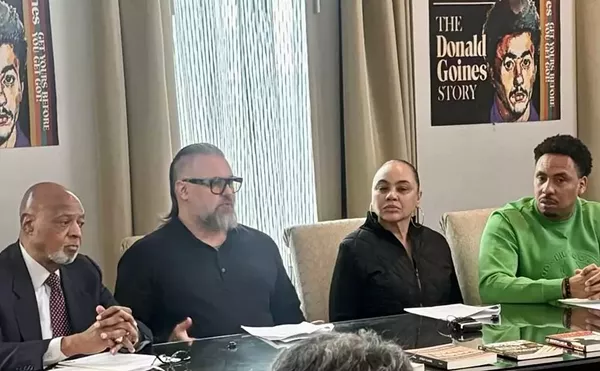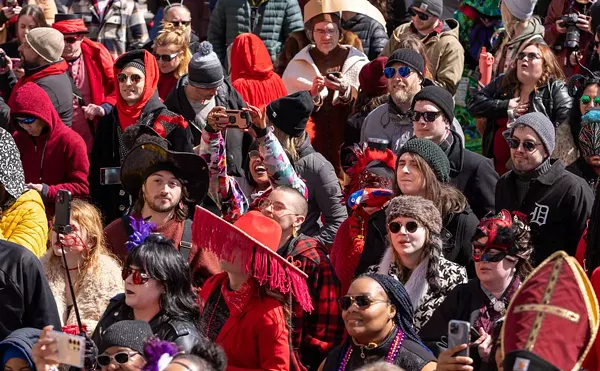"Do you mind if I put my feet up?"
Erika Block's question, posed as she sat down for an interview at 7 p.m. on a Friday, was almost laughable. Block and Hilary Ramsden, artistic directors of Walk & Squawk Performance Project, were sitting in an office fashioned from wood beams and salvaged desks. Their makeshift work space lay one floor above 15,000 square feet of crumbling brick and debris which, in one short month, would have to be transformed into a black-box theater, lobby and coffee bar in time for a gala opening. The women had just finished a daylong rehearsal for their on-the-edge, highly physical take on Macbeth.
During breaks, they'd been attending to the myriad details that come with renovating a long-unused warehouse in one of the city's most notorious neighborhoods. Their arms and legs were covered in dust and sweat. Ramsden, donning shorts and a wool scarf, looked as if she hadn't had time to stop home for season-appropriate clothing since July. And Block wanted to know if was OK to put her feet up?
Of course, Walk & Squawk had built its theatric reputation on this same salient mix of unorthodoxy and affability. The creations of one of the few and most highly regarded physical theater troupes in the country were challenging in both subject matter and presentation, yet never so over-the-top that audience members felt alienated or confused. On the contrary, Block and Ramsden used their unique approach, where gesture became a transcendent language, to build bridges and draw people in. So it was only fitting that the newest member of their company would reflect the same ethos.
Enter the Furniture Factory. In the six months since Block and Ramsden first signed a long-term lease for the former Weber's furniture showroom and warehouse, the building had truly become the leading player in the Walk & Squawk troupe. All decisions — logistic, programmatic and theatric — had been made with the Furniture Factory's strengths and weaknesses at the forefront of the directors' minds. And, of course, it was up to Block and Ramsden to keep their new star happy — two-by-fours, light bulbs, voice mail; whatever the Furniture Factory needed, Block and Ramsden provided it.
This was new ground for a troupe that has been nomadic for its entire five years of existence, maintaining a small office space in Ann Arbor and performing at venues throughout southeast Michigan. Contrary to conventional wisdom, though, Block and Ramsden said that settling down, despite all the sweat and long hours, let them free up and reach out.
Block turned to a literary master to explain.
"I think it's Blake who has a poem which talks about how more structure gives you more freedom to create and improvise," she said. "In a way, having a structure of a building gives us the freedom to riff. It's like a springboard."
In true riffing fashion, which the pair exhibit frequently, Ramsden jumped in with a more preferable word.
"It provides focus," she explained. "For me as a performer it is literally a home," she continued. "It's a bit like when you travel around personally and you carry all your bags with you, you’re so concerned with 'OK, I've got this new place now and I’ve got to make sure this is all right and that's all right.' You can never really unpack and you don't have the freedom to say, 'How can I set this new home up and, having set this new home up, what will come out of it?'"
Now that they'd been in charge of everything from sound and lighting to publicity to the state of the bathrooms, Block and Ramsden knew what to expect. This, in turn, they said, had allowed them to run with their ideas for the space. And they got out of the starting blocks sprinting.
The Mercedes parked outside the Furniture Factory on a Tuesday morning in early September indicated just how much things were changing at Third Avenue and Alexandrine. While Detroit's Cultural Center had begun to expand significantly in the past year, the activity had centered on Woodward and Cass avenues. Further west, around the Furniture Factory, vacant lots, party stores and drug dealers were still the primary attractions. But this fact hadn’t deterred Block and Ramsden in the least.
Upstairs, in their finished rehearsal space, the directors were telling a group of reporters, board members and neighborhood boosters about their new season, kicking off in October. They'd open with Something Wicked This Way Comes, their version of Macbeth and the first in the new "Walk & Squawk’s Take on Classics" series.
That would be followed by Gogol's The Government Inspector. The holiday season would bring visiting artist Janice Perry's Holy Sh*t! Stories from Heaven and Hell. Also, two visiting South African performers, in the midst of a residency with the troupe, would offer gumboot dancing workshops. And Ramsden would continue her popular movement workshops for women. Oh, yes — and not to forget the Squawk Sessions — the monthly after-show club concerts featuring a variety of music, including hip hop, jazz, world music and electronic. The sessions would open Nov. 4 with DJ Carl the Invisible Man.
Now, anyone who follows Detroit development with any regularity knows to take such bold proclamations with more than a little cynicism. After all, we're still waiting for that grand waterfront aquarium announced, with front-page fanfare, in 1992. And how about that contemporary art center? Or the downtown loft district? But Block and Ramsden were a step ahead of this crowd. They had their info all down on paper — with dates! And those dates were in the near future. So near, in fact, that one could look out from the rehearsal studio — the only finished room in the whole building — and wonder if Block and Ramsden had inhaled too much sawdust.
Back in the office, though, it became clear that Ramsden and Block hadn't even considered the possibility of phasing those events in over time. That's because Walk & Squawk isn't just about presenting theater. It's about the process that builds it as well. So integrated are the two that Block and Ramsden couldn't imagine having one without the other.
"That is reflective of how we work our theater, the way we work in our collaborative way," Block began to explain. "We love the idea of this cross-pollination of forms, of ideas, of people, of disciplines …"
" … and why wouldn't you want all those things?" Ramsden riffed, her tone gently implying that the idea of starting small and building up was completely absurd. "It's so much richer. You have to keep a certain focus, maybe, or you can't have everybody doing everything at once — but why wouldn't you want a DJ to come in and do a great dance party or why wouldn't you want somebody to show their embroidery work? Everything is there."
Plus, she added, "We didn't want to open the space without giving our audience a sense of what the possibilities are."
As is necessary to succeed in their profession, Ramsden and Block are not just talented artists but savvy businesspeople. As such, they quickly pointed out that some of their ventures — like the coffee bar and the office space they’ll rent to other arts organizations and small firms — are intended to nurture their coffers as well as their creativity.
"What we also are creating is an art enterprise venture which allows us to focus on creating more earned income and not being reliant on donations and grants, but without having to commercialize the theater," Block explained.
But as the discussion continued, it became clear that her and Ramsden’s primary aim was to build not just a theater but a community. To stimulate discussion at the coffee bar after the show. To draw a new theater patron in through a dance party. To enliven a neighborhood where Ramsden — a transplant from Great Britain — found surprising beauty every day in the roses which crawled up from the underbrush.
"It can enmesh to create a facility that's got layers," Block pointed out. "It's community. It keeps coming back to that — broadening the possibilities of community and the players."
And what of the community where Ramsden and Block had decided to plant their roots? Wasn't it a bit odd to move an arts organization's operations from a coveted downtown office in a large university town to a location just up the street from Jumbo's Bar and within spitting distance from Tomboy Market? To a city that was still struggling? To a neighborhood that hadn't seen new commercial development in more than a decade?
Not at all, the pair contended. "There aren't as many coffee shops as there are in Ann Arbor or as many bookshops, and that's something I miss," conceded Ramsden. "But for me there's still the flavor of a city and that's really important."
Perhaps even critical, Block suggested, adding that Walk & Squawk has always had a strong presence in Detroit. "Urban communities have always been a catalyst to work, especially work that pushes the envelope," she explained.
So inspired was Block by her new environs that she was already planning a piece based on stories about the old Willis Show Bar, a legendary Cass Corridor haunt, which was just up the street from the Furniture Factory. A piece dealing with the political and social climates of both Detroit and South Africa, where Block and Ramsden had worked as artists-in-residence, was also on her mind.
"It's all these different things — the diversity of the community, the opportunity to be rooted in a place so that you look around and all of a sudden you start to have ideas that come out of that place. It gives you something to start from," Block explained.
And again, business factors weighed in. "We couldn't get this in Ann Arbor with what the market is like there," Block observed. "We probably couldn't have gotten this in Detroit if we had waited another year. Actually, we probably slipped in just in time."
So now Walk & Squawk was in time and down to the wire. With one month until their gala opening, the group was having daily rehearsals and, in between, consultations, conversations and inspections with contractors, bureaucrats and even people wandering in off the street who didn't share their extraordinary vision. People like that stifled projects in Detroit regularly. Especially projects as innovative as Walk & Squawk's (was anyone else in town planning to stage drive-in theater, complete with carhops, in their parking lot?).
Whether it was the actors in them, attracted to risk and reliant on creativity; their inner administrators, with a knack for finding workable solutions; or just plain, old-fashioned fortitude, Ramsden and Block pressed past every stumbling block, full speed ahead.
"I've always reacted really badly when people say, 'You can't do that,'" Ramsden explained. "I really want this to be a space where somebody can come in and say, 'I've got an idea and I'd like to do this' and I have the chance to say, 'Gosh, I never thought of that, but let's see if we can do that.'"
Block, in turn, called up a phrase she'd recently rehearsed to illustrate her stance. "There's a line in Macbeth, 'Security is mortals' chiefest enemy,'" she recalled. "The fact that things are constantly changing, there's risk involved, nothing is clean and perfect and pristine and unchanging — that's what yields great work. A little insecurity can go a long way."
Which prompted Ramsden, at that late hour, to wax philosophic. "The idea of security is a bit of a myth that we've made up because we're trying to escape death, I suppose, or we're trying to cheat death."
"Or create order out of chaos," riffed Block. "Of course we're trying to do that too. It is a kind of security we’re going after."
"Yes, it is," Ramsden concluded. "But I hope it's a kind of chaotic security."
The stars of this show — Ramsden, Block and the Furniture Factory — wouldn't have it any other way.
Feverish was the word as things came down to the wire this past week at the Furniture Factory. The theater, rehearsal spaces, gallery, café, the new side door, even the parking lot were almost ready for crowds of people. Workmen moved drywall and beams, actors tried their lines in the great new space, as Block directed a run-though of Something Wicked …
With the grand opening just days away, she said, "Rehearsals are constantly being interrupted by construction, actors interacting with contractors. It's the hardest thing I've ever done in my whole life. It's like giving birth, having a child. But you can't anticipate
what it's going to be like until you're in it."






